Lunch Time
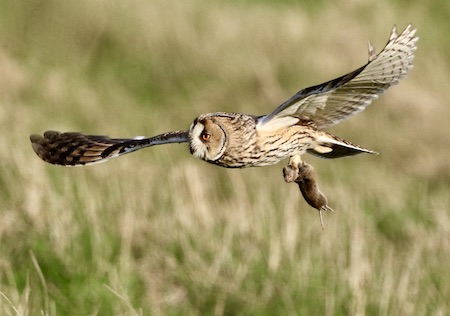 In the Pennines nine out of ten items of prey caught by Long Eared Owls are Short Tailed Field Voles .Just occasionally a Rat is caught and provides a much more substantial
In the Pennines nine out of ten items of prey caught by Long Eared Owls are Short Tailed Field Voles .Just occasionally a Rat is caught and provides a much more substantial

 In the Pennines nine out of ten items of prey caught by Long Eared Owls are Short Tailed Field Voles .Just occasionally a Rat is caught and provides a much more substantial
In the Pennines nine out of ten items of prey caught by Long Eared Owls are Short Tailed Field Voles .Just occasionally a Rat is caught and provides a much more substantial
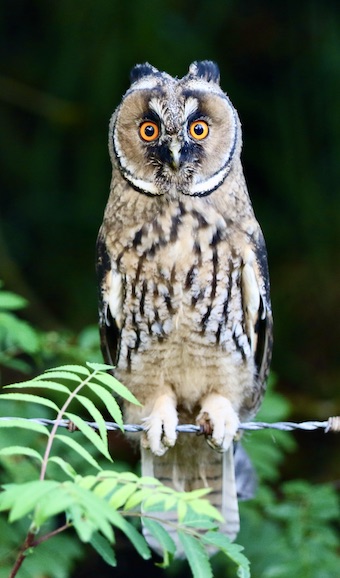
Once again another Spring has passed with superb weather and endless hours spent filming the Pennines most exciting Owls – Long Eared and Short Eared – the good news is that both species have had successful breeding seasons this year.This weeks photos show several different fledged Long Eared and a Short Eared. Over the next few weeks I will include photos of different hunting male Long Eared Owls including a rarely seen food-pass between male and female Long Eared Owls.
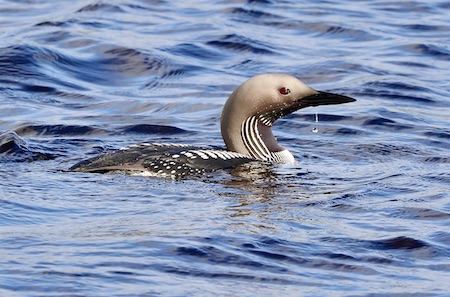 Two of Scotland’s rarest breeding water birds can be found on secluded lochs in the Highlands. Last week not only was I able to film a pair of Black Throated Divers feeding two young but the same morning I came across a pair of Slavonian grebes also with two young. Both species were filmed from the car on public roads and so a licence was not required.
Two of Scotland’s rarest breeding water birds can be found on secluded lochs in the Highlands. Last week not only was I able to film a pair of Black Throated Divers feeding two young but the same morning I came across a pair of Slavonian grebes also with two young. Both species were filmed from the car on public roads and so a licence was not required.
While I was in the Highlands I have always wanted to find a plant called Twin Flower It grows in the Caledonian pine forests and last week was perfect timing as we found over a thousand in one secluded spot.
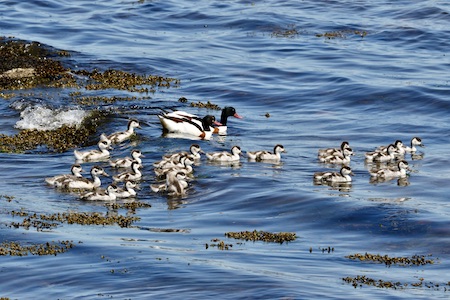 One of the attractions of Islay to the wildlife enthusiast is that you can never predict what wildlife will present itself to you. One minute it is a gathering of Black Guillemots, a passing Hen Harrier carrying nesting material, groups of Roe Deer, but best of all a pair of Shelduck with 22 young. www.facebook.com/gordonyateswildlife
One of the attractions of Islay to the wildlife enthusiast is that you can never predict what wildlife will present itself to you. One minute it is a gathering of Black Guillemots, a passing Hen Harrier carrying nesting material, groups of Roe Deer, but best of all a pair of Shelduck with 22 young. www.facebook.com/gordonyateswildlife
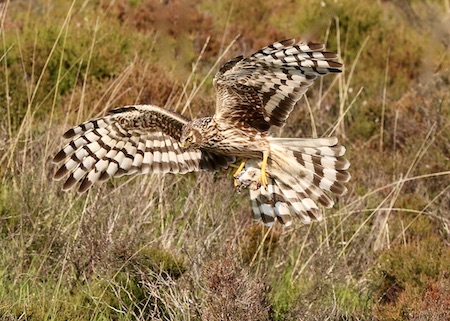 On the 13th June last month I had a brilliant four hours in my hide on Islay filming a female Hen Harrier as she flew to her nest with prey. It is something I have done before under Special Licence from NatureScot and is a privilege I have always valued. It was only when I got home and checked my diaries that I found on the 13th June 1973 I filmed my first ever Hen Harriers nest on North Uist. In those 50 years I have spent many hours filming 65 pairs of Hen Harriers which must make me the most experienced Hen Harrier photographer in Britain!!
On the 13th June last month I had a brilliant four hours in my hide on Islay filming a female Hen Harrier as she flew to her nest with prey. It is something I have done before under Special Licence from NatureScot and is a privilege I have always valued. It was only when I got home and checked my diaries that I found on the 13th June 1973 I filmed my first ever Hen Harriers nest on North Uist. In those 50 years I have spent many hours filming 65 pairs of Hen Harriers which must make me the most experienced Hen Harrier photographer in Britain!!
Sadly the Hen Harrier today is under more threats than it was in 1973 and I would urge every reader of my blog to do what they can to help in its protection.
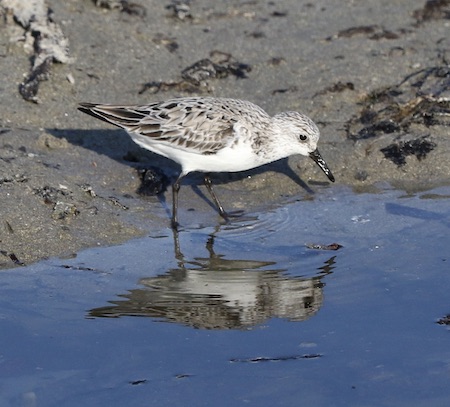 Our 117th visit to Islay was blessed with unbroken sunshine and a max temperature of 28C! For a wildlife enthusiast Islay has everything to offer and it was good to see the great variety of Waders still present when we arrived. Sanderling and Turnstones were bound for Greenland and some were now in summer plumage. Snipe were displaying and Common Sandpipers seemed to be found on every hundred yards of coastline.Redshank and Curlew were also present in good numbers and now all had young to look after. www.facebook.com/gordonyateswildlife
Our 117th visit to Islay was blessed with unbroken sunshine and a max temperature of 28C! For a wildlife enthusiast Islay has everything to offer and it was good to see the great variety of Waders still present when we arrived. Sanderling and Turnstones were bound for Greenland and some were now in summer plumage. Snipe were displaying and Common Sandpipers seemed to be found on every hundred yards of coastline.Redshank and Curlew were also present in good numbers and now all had young to look after. www.facebook.com/gordonyateswildlife